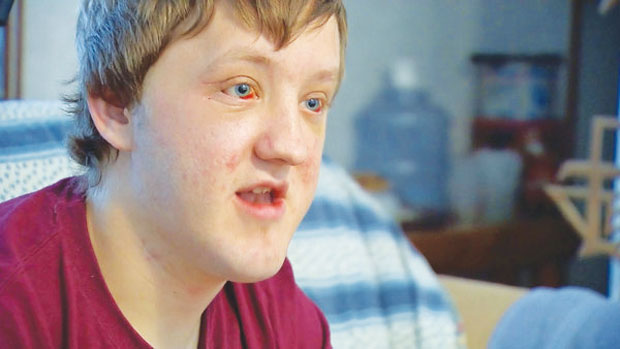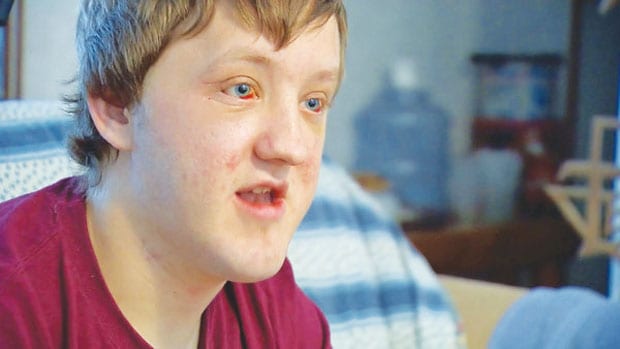Police are investing brutal beating in Springtown as hate crime, while victim waits to see if some of the injuries sustained are permanent

ON THE MEND | After facial reconstruction surgery, Arron Keahey now has a metal eye socket, but parts of his face are still numb from nerve damage, which may be permanent. (Photo courtesy of WFAA)
Arron Keahey has spent the last month recovering after an encounter on a phone app nearly cost him his life.
Keahey, 24, starting talking to 18-year-old Brice Johnson on the app MeetMe on Labor Day. Keahey, who lived in Dallas at the time, was staying with family in Springtown, a small town about 70 miles west of Dallas in Parker County, for the holiday weekend.
The two started chatting in the early morning and kept messaging for about an hour until they agreed to meet in person. Keahey then drove the 15 minutes to Johnson’s house.
“I don’t remember if he said he was bisexual or if he said he was gay, so I just took him as some guy that usually dates girls but is undercover about his sexuality,” Keahey told Dallas Voice.
But when he arrived, Keahey said Johnson was upset and attacked him. He only remembers meeting him before the memories go dark.
“When I showed up, I only remember talking to him for like a minute,” he said. “All I remember is that happened and I woke up in the hospital four days later.”
Keahey’s injuries included brain trauma, nerve damage and broken facial bones. The pressure on his brain made doctors doubt he would even survive.
“They didn’t expect me to make it through the night,” he said.

BEATING THE ODDS | Keahey was unconscious for four days after the attack, which doctors didn’t expect him to survive. (Courtesy photo)
Keahey had to have facial reconstruction surgery and has a metal eye socket now. He couldn’t walk for three weeks and recently stopped using a walker. The nerve damage caused the right side of his nose and area around it to go numb and his right hand to shake. He said doctors expect to know if the damage is permanent in six to 18 months.
Keahey was taken to the hospital by Johnson, who was arrested by police for the attack on Sept. 10. He was charged with aggravated assault causing serious bodily injury, a second-degree felony. He has since been released on a $25,000 bond. If prosecutors seek a hate crime enhancement under state law to a first-degree felony, he could face five years to life in prison and up to a $10,000 fine, according to the Texas Penal Code.
Johnson doesn’t have a previous criminal record, according to public records.
Springtown police Lt. Curtis Stone, the investigator on the case, said he is investigating the attack as a hate crime. Stone said he’s not sure what the motive behind the assault was, but he’s waiting on the transcripts of Keahey and Johnson’s chat on the app.
“It is being investigated as a hate crime,” he said. “It won’t be determined as a hate crime until it goes to trial and prosecutors can evaluate it.”
Stone said when Johnson brought Keahey to the hospital, he told police he was supposed to meet Keahey, but he heard a car alarm go off and found Keahey in the trunk of his car, badly beaten. But the story didn’t make sense and police later found out that Johnson was responsible for the attack.
“During interviews, he did admit to the initial part of the assault,” Stone said. “He remembers starting to assault him and then he blacked out.”
There’s currently no evidence to suggest that other people helped Johnson.
“Is it possible that there were more people involved? Yes,” Stone said. “But there’s nothing at this time to prove that there was anyone else.”
Police departments report bias-motivated incidents to the FBI under the federal Hate Crime Statistics Act. Online records show the Springtown
Police Department hasn’t reported a hate crime to the FBI in more than a decade.
Stone said this type of violence is not common in the small town.
“I’ve been here 11 years and this is the first [possible hate crime] that I’ve worked on,” he said.
Although the investigation is focusing on the possible bias in the case, Keahey said he knows he was targeted because no other explanation makes sense to him.
“He didn’t take my wallet, he didn’t take my money,” he said. “[Hate] was the reason behind it. Why else would he say I’m bisexual or gay and then have you show up and come to the house and then all of sudden decide to do that to you?”
Keahey said when he normally chats with guys on the app, they either talk to him or say they’re not gay.
He said Johnson kept telling him he wasn’t straight and if he changed his mind about meeting when he got to his home, he likely would’ve said something rude or beaten him up to make him leave, not nearly killed him.
Keahey hopes Johnson pays for the attack and anyone else who may have helped assault him.
“Honestly, I just hope he sits in prison. I don’t care how long. I don’t care if it’s five years or 25 years,” he said. “I just hope that everyone involved gets caught.”
Keahey has moved to Springtown to be with family while he recovers, but he said he plans to move back to Dallas soon to start his life again.
But after all he’s been through, he said his trust in people has greatly diminished. And he wanted to talk about his experience so other people would be careful in the future.
“Don’t trust people on the Internet,” he said. “I believe the more people talk about these things, the less they’ll happen.”
This article appeared in the Dallas Voice print edition October 4, 2013.

